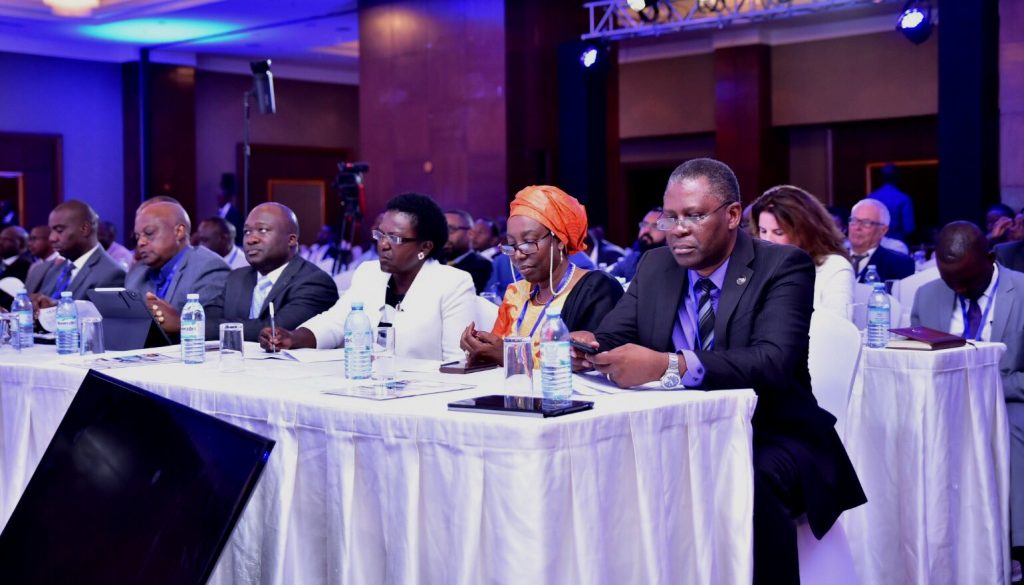Regional logistics industry asked to improve efficiencies
 Azuba challenged the experts in the logistics industry to come up with feasible solutions that will improve regional performance.
Azuba challenged the experts in the logistics industry to come up with feasible solutions that will improve regional performance.
August 23—The regional logistics industry has been asked to work closer together in ways that will strengthen and increase efficiencies as leading French firm, Bolloré Transport & Logistics hints of building a new cargo handling complex in East Africa.
“I am challenging the experts in the logistics industry to come up with feasible solutions that will improve the sector’s performance index ranking in the region,” Monica Azuba Ntege, Uganda transport minister told the Regional Logistics Expo forum on Thursday.
The logistics industry includes customs clearance, freight forwarding, warehousing, transportation, port services and air cargo. Earlier this month, Philippe Labonne, deputy managing director of Bolloré Transport & Logistics said their strategy is to develop hubs in Africa. “We have identified eight of them, such as in Abidjan, where we are building an ‘aerohub’ so that goods can arrive by sea and be redistributed by air. It’s sort of confidential, but I can tell you that we’re looking closely at Nairobi, Kigali, South Africa,” he told the French publication Jeune Afrique.
Azuba said Uganda has recorded mixed results in rankings for the movement of goods and services between 2007 and 2016. The country’s logistics performance index ranking jumped from 83rd position to 58th, however between 2016 and 2018, its rank dropped from 58th position to 102. Kenya is the regional hub with the biggest fleets and container facilities based in that country, arranged along the Northern Corridor route from Mombasa.
According to a recent report by financial services firm, pwc, intra-trade in Africa tends to be low in comparison to its global counterparts because of poor infrastructure and because most economies continue to be resource based. Currently only about 11 pc of Africa’s trade is with other African trading partners, compared to Asia where half the trade is between the countries in that region. There are infrastructure barriers to trade. It takes a substantial amount of time and money to cross borders and trade because of the poor logistics and transport infrastructure.
Under the theme ‘Innovative and Sustainable Solutions for freight Logistics’, Azuba said, “While the industrial works for transportation system has been developed at both national and regional level, those for logistics are underdeveloped. I urge you, in your discussions, to deliberate more on this and come up with solutions on how government can assist you on this aspect. Besides enactment of existing infrastructure, organisational and regulatory framework for logistics and multi-modern transportation needs to be established at regional levels.”
She said the government is committed to improving the transport sector including railways, roads, air and water transport, citing the progress of the Standard Gauge Railway project, revival of Uganda Airlines, construction of a new airport in Hoima, construction of the Gulu Logistics Hub, among other projects. But she said the private sector are the major players and need to do more in their organisation and regulation frameworks.
Elly Karuhanga, who fronts the Uganda Chamber of Mines and Petroleum suggested those in the logistics business should come up with long term strategies to ensure development and sustainability of the sector.
The TradeMark East Africa, (TMEA) Uganda country manager, Moses Sabiiti, said developing and regularising the logistics sector will improve Uganda’s trade competitiveness and also enhance regional integration. He said, “Logistics represents a key factor in improving the competitiveness. It also enhances regional integration which had been a major factor that drove growth in EAC between 2005 to 2015,” he said
TMEA has being playing a central role in the development of the logistics sector in Uganda. In partnership with the Ministry of Works and Transport, TMEA is channeling money the Gulu Logistics Hub that will serve northern Uganda, South Sudan and parts of the Democratic Republic of Congo. Actual construction of the hub is expected to start by end of this year. TMEA has also been the main facilitator for coordinating donor money in setting up One Stop Border Posts that have eased cross-border trade.

 African Heads of state head to South Korea next week for Summit talks
African Heads of state head to South Korea next week for Summit talks
 Trading leads as main source of income for Ugandans
Trading leads as main source of income for Ugandans
 New leadership for bankers’ umbrella as total assets top $12 billion
New leadership for bankers’ umbrella as total assets top $12 billion
 Brussels Airlines to announce Nairobi service
Brussels Airlines to announce Nairobi service
 SITA promises enhanced travel experience after Materna acquisition
SITA promises enhanced travel experience after Materna acquisition
 Saudia’s 105 aircraft order stretches A320neo lead over rival Max
Saudia’s 105 aircraft order stretches A320neo lead over rival Max
